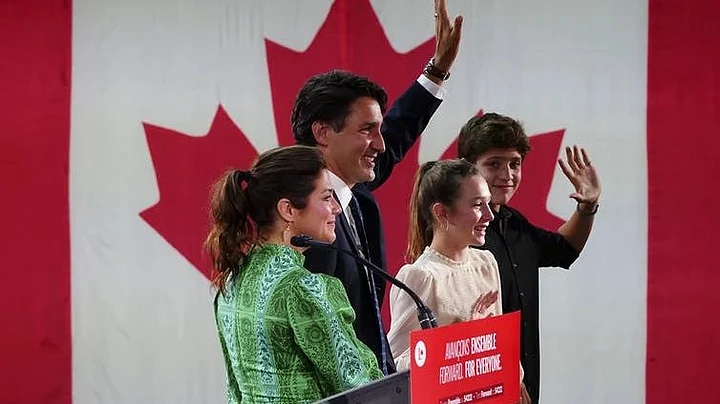Seventeen Indo-Canadians successfully contested Canada’s 2021 parliamentary elections in which Justin Trudeau retained the post of prime minister.
All three Indo-Canadians in Trudeau’s previous Cabinet – Defence Minister Harjit Singh Sajjan, Diversity Minister Bardish Chagger, and Public Services Minister Anita Anand – also won their re-election.
Most of the 17 winners are of Punjabi origin. But Canada is the same country where the infamous Komagata Maru incident of 1914 occurred.
The white population of Canada in the early twentieth century was deeply antagonistic to non-white immigration.
According to the Canadian Museum for Human Rights, in April 1914, a Japanese steamship consisting of people trying to immigrate from the Punjab Province of British India to Canada was sent back.
There were 376 Indian passengers on the Komagata Maru, out of which 340 were Sikhs. The Sikhs continued to face difficulties in immigrating to Canada for many years to come.
Large scale immigration of Punjab Sikhs to Canada only began after the 1950s. Today, according to Canada’s 2011 National Household Survey, the Sikh population in Canada is around 500,000, comprising 1.4 percent of the total population.
So how did Punjabi Sikhs manage to establish themselves as such an influential and significant force in Canadian politics in a span of seven decades?
There are two inter-related answers to this question – the long history of active political engagement by the Indo-Canadian Sikhs combined with their unity and organisational strength, and their work ethic.
Political Engagement, Unity, and Grassroots Network
During the first years of their immigration to Canada at the beginning of the 20th Century, the Sikh community faced marginalisation due to racist policies of the state and the attitude of the people.
Research on Canada’s Indian diaspora by Anita Singh and Milan Singh – Diaspora, Political Action, and Identity: A Case Study of Canada’s Indian Diaspora – has shown that this historical marginalisation resulted in the commencement of Sikh political activism.
This included but was not limited to the establishment of gurudwaras and organisations like the Khalsa Diwan Society that would raise money and fight for safe passage of Punjabi immigrants from India into Canada.
Sikh activists would also help immigrants with housing and jobs, and would also challenge the racism that was creating these problems in the first place.
This kind of activism ensured that members of the Sikh community became familiar and involved with politics and society from a young age. This culture has not ceased to exist today.
For instance, two out of the seventeen winning candidates – Bardish Chagger and Anju Dhillon – volunteered for high profile Canadian MPs Andrew Telegdi and Paul Martin respectively when they were both aged only 13.
Therefore, the establishment and progress of pro-Sikh institutions not only supported the flow of Sikh immigrants into Canada, but also created a political conscience that has been carried forward till now.
These factors have culminated into widespread grassroots networks that contribute massively to fundraising and campaigning during election season.
The Vancouver Sun reported that the political clout of Sikh Canadians is greatest at the local level, where the network starts from board elections at gurudwaras.
Those who control the local gurudwaras influence dozens of Sikh families, thereby gaining access to two important things required in politics – money and volunteers.
This kind of organisational strength gives the Sikh community a level of political clout in Canada that other immigrant populations can only hope for.
Satwinder Bains, director of the Centre for Indo Canadian Studies at the University of the Fraser Valley, called the Canadian Sikh community “very savvy, politically astute” and said that each political party in Canada has understood that well, reported Hindustan Times.
Work Ethic
A closer look at the profiles of the 17 Indo-Canadian winners of the 2021 election shows us how the community emphasises hard work and diligence as the keys to success. All of them are highly educated and work in extremely skilled sectors of the job market.
Six of the 17 winners – Jagmeet Singh, Arif Virani, Iqwinder Gaheer, Randeep Sarai, Ruby Sahota, and Anita Anand – have some kind of experience in law.
Meanwhile, Kamal Khera is a registered nurse and Sonia Sidhu worked for more than 18 years in Canadian healthcare. Harjit Sajjan has served as a detective in Vancouver’s police department.
Sajjan was previously a lieutenant-colonel in the Canadian Army and the first Sikh to command a Canadian regiment.
Not only have the Indo-Canadians managed to make a name for themselves, they have also done it in fields that directly contribute to society – law, medicine, security, and education.
Such level of engagement with the people and with society, and their experience in community-building activities, make the Indo-Canadians ideal political candidates who seek to serve the people.
However, it was not always easy for the Canadian Sikhs to work in such jobs.
The New York Times reported Harjit Sajjan saying that when he first joined the Canadian military in 1989, he was told that his turban and religious identity could constrain his career.
But Sajjan refused to let this stop him from getting he wanted. He continued to serve in the military and ended up attaining a top rank in his class while graduating, epitomising the work ethic that the Sikh community in Canada espouses.
(With inputs from the Canadian Museum for Human Rights, the Vancouver Sun, the Hindustan Times, and the New York Times)
(At The Quint, we question everything. Play an active role in shaping our journalism by becoming a member today.)





